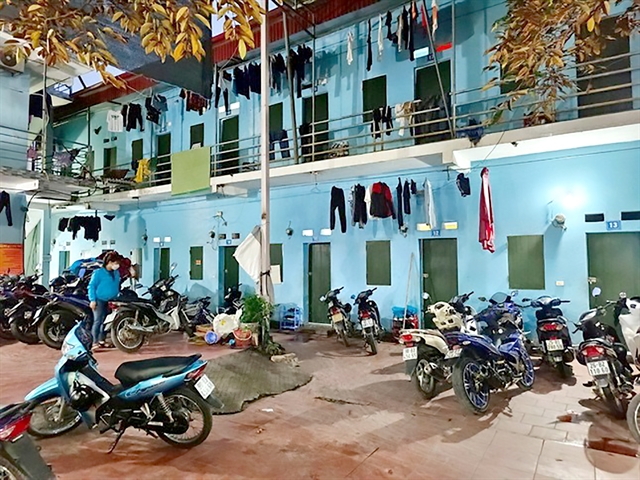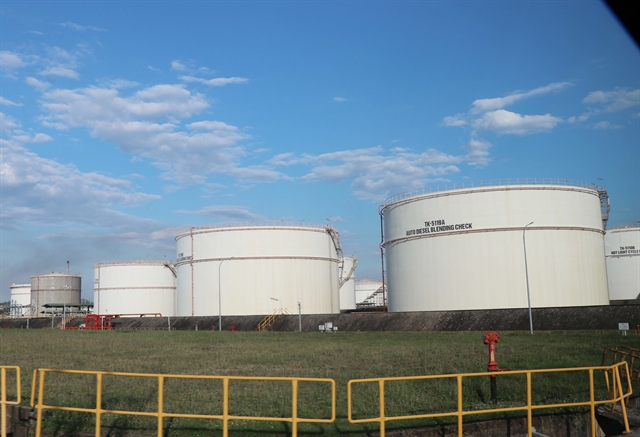 Society
Society

Dương Văn Công, a worker in Hosiden Việt Nam Co., Ltd, has lived with four members of his family in a 20sq.m rented room for nearly a decade in Nếnh Township, in the northern province of Bắc Giang.

|
| A row of rented rooms in the northern province of Bắc Giang. — Photo tienphong.vn |
BẮC GIANG — Dương Văn Công, a worker in Hosiden Việt Nam Co., Ltd, has lived with four members of his family in a 20sq.m rented room for nearly a decade in Nếnh Township, in the northern province of Bắc Giang.
Công said he and his wife moved in when his wife was about to give birth to their first child in 2013.
There is only enough space for one bed, one desk for his two children and a small wardrobe, he said.
Công told Tiền Phong (Vanguard) online newspaper that said his mother also now lives with his family. She takes care of the children when he and his wife go to work.
“We have five members living in the tight room, it’s so cramped,” he added.
He said the row of 20 rented rooms has only three public toilets.
“It’s very inconvenient for more than 40 people to share only three toilets,” he said.
“My wife and I many times planned to move to another rented room with a separated toilet, however, the price is high,” he said.
So, they continue to live there to save money to bring up their children, he said.
Công's story isn't unique; a lot of workers in industrial parks have also been living in cramped rented rooms in the province.
Hoàng Văn Tuyên, another worker, said he lives with his pregnant wife in a 10-sq.m rented room. He said his wife is about to give their first child.
Two people living together in the rented room is still fine, but if their child is born, room will be tight, he said.
Tuyên said he and his wife earned a total of VNĐ16-17 million (US$685-728) each month.
They only save about VNĐ5-6 million (US$214-256) each month after paying for accommodation, electricity and water, meals and other necessary expenses, he said.
He wishes he rent a small apartment at a reasonable price in a social housing building for his three-member family to live in, Tuyên said.
Lack of social infrastructure
Hoàng Quang Phòng, deputy chairman of the Việt Nam Chamber of Commerce and Industry (VCCI) said that practical surveys show that there is a huge shortage of services for workers in industrial zones, such as social housing, training services and kindergartens for workers' children.
Most industrial zones in the country are designed for domestic or foreign-invested enterprises to rent and serve their production, but lack investment into other social infrastructures, he said.
The Government and the Ministry of Construction have policies to encourage investors to invest in social infrastructure for workers in industrial parks, he said.
However, it is necessary to have more specific support policies from the authorities to encourage investors to build social housing for workers in particular and social infrastructure in general, he added.
This became particularly acute during the COVID pandemic, especially when workers returned to their hometowns due to fear of an outbreak of the disease.
Phạm Hồng Điệp, Chairman of the Board of Directors of Shinec Joint Stock Company, said the reason why investors have not paid more attention to social housing projects is due to a lack of capital.
Another reason is the lack of land funds, he said.
But most importantly, there is a lack of incentives because the investment process for social housing projects is not much different from commercial housing projects, but the selling price for the apartments and profit that the social housing projects bring is much lower compared to commercial housing projects, he said.
Nguyễn Văn Phấn, head of the Investment and Industrial Zone Management Office in Bắc Giang Province, said that calling investors to implement social housing projects in the locality is very difficult.
Because the current laws only allow an investor to build a maximum of 20 per cent of commercial apartments in a social housing project, he said.
During the dialogue between the Prime Minister and workers on June 12 in Bắc Giang Province, Dương Văn Thái, Secretary of the provincial Party Committee, said that the locality has 250,000 workers, including a third from other localities.
Therefore, the demand for housing is very large, he said.
The province currently has 19 social housing projects, including 14 that are deploying. It is expected to provide accommodation for about 110,000 workers.
However, the most problematic issue is regulations on housing rental contracts between construction enterprises and workers, he said.
Accordingly, the lessor must directly sign a contract with the workers. If a business provides housing for about 20,000 workers, it has to sign up to 20,000 contracts, causing inconveniences, he said.
Besides, the workers change jobs, moving to other places also makes it difficult for authorities to support accommodation, he said.
Other difficulties include the price of the accommodation for rent not being regulated specifically, as well as the exemption and reduction from land rent for the investor in the Law on Housing, the Law on Land and the Law on Public Investment, he said.
Recommendations
Thái suggested that the Government soon submit to the National Assembly to amend the unsuitable regulations to fix the situation.
In the meantime, Điệp said the construction ministry is advised to coordinate with relevant agencies to study and amend the 2014 Law on Housing in the direction of promulgating more separate mechanisms and policies on investment and construction of housing for workers.
Phấn said the local administration needs to strengthen the direction of housing development for workers.
More importantly, it has to create an attractive environment to mobilise resources for the development of social infrastructure for workers in the industrial park, he said. — VNS




